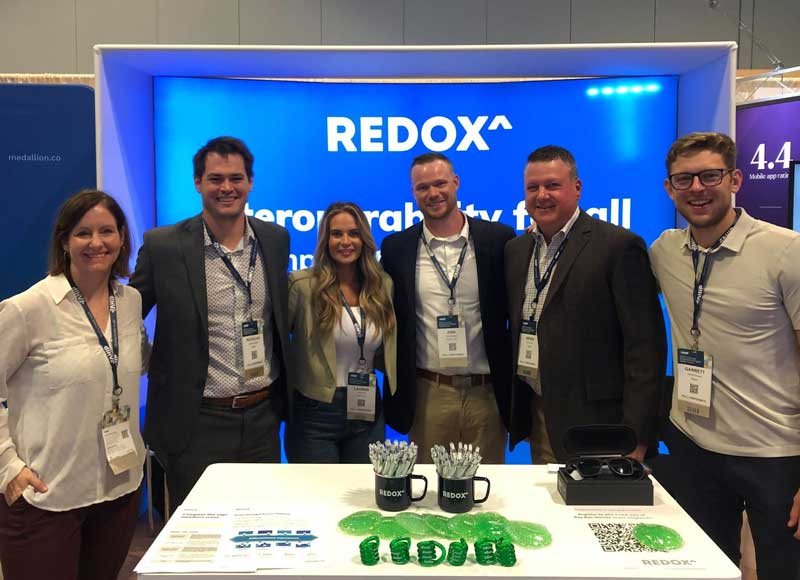Top 3 takeaways from the AHIP Consumer Experience & Digital Health Forum
Oct 05, 2022

Last month Redox was thrilled to sponsor the first in-person AHIP Consumer Experience & Digital Health Forum since 2019. The event convened health plan and solutions leaders to explore evolving consumer expectations, technology best practices, and the ever-shifting healthcare landscape.
We loved the opportunity to engage live with payers (and payer solution providers) at our first payer-focused conference since we launched Redox for Payers last year. We met many new friends, caught up with a few old ones, and took in gobs of new information. We thought we would share the wealth with our top 3 takeaways:
1. Interoperability is required (for pretty much everything)
There was a whole track focused on “Interoperability, Analytics & Actionable Insights”, including a session on Accelerating value-based care adoption through interoperability, presented by our very own Garrett Rhodes and Sahir Jaggi from +Oscar, but every session we attended, in any track, had at least some mention of the challenges with and/or need for interoperability.
UPMC Health Plan led a session on evolving digital-first offerings. One of their major challenges has been integrating their new virtual care solutions across a patchwork of 10+ electronic health records (EHRs) in their network.
Onduo Chief Science and Innovation Officer, Erich Huang, talked about how looking only at clinical and administrative data misses the “dark matter” of health – the daily data from devices and digital applications that are so important in understanding and managing chronic disease.
During a keynote on digital strategies to advance health equity, Christina Silcox from the Duke-Margolis Center for Health Policy talked about the challenges of collecting information on the social determinants of health and sharing the information across the healthcare landscape. Interoperability would help ensure every entity doesn’t have to ask and continue to ask the same sensitive questions.
While interoperability and data access were presented primarily as a challenge in many sessions, there were some bright lights showcasing some forward momentum.
Kirk Anderson, Chair of the HL7® DaVinci Project Steering Committee talked about how the DaVinci implementation guides and FHIR standards are helping Regence (a payer in the Pacific Northwest) and providers like MultiCare transform prior authorization. (We’re doing that too, by the way – check out our case study).
Micky Tripathi, National Coordinator for Health Information Technology, Office of the National Coordinator for Health IT (ONC) provided a bit of insight into how interoperability regulations are evolving and how Payers can benefit from joining TEFCA.
2. Partnerships are critical
Digital health solutions may be the key to solving some of healthcare’s thorniest issues, but collaboration will be required to achieve full impact. Payers, providers, networks, employers, vendors, and others must come together to design, implement, and drive the adoption of solutions. This was clear in sessions on a wide range of topics including value-based care, prior authorization, virtual care, chronic disease management, and more.
During a session on collaboration between health plans and health data networks, Jackie Ejuwa, Vice President of Health Transformation Acceleration at Blue Shield California, emphasized how important it is to get information to providers in their EHR workflows so they can access it and use it in practice. In the same session, Redox customer, Manifest MedEx’s Chief Growth Officer, Adam Harrison, shared how they have teams working with hospitals, ambulatory provider practices, medical groups, and more to figure out the best ways to put data directly into clinician workflows.
3. Priorities are in the right place, but the digital health landscape is overwhelming
It was clear from both the sessions and our interactions in the exhibit hall that almost everyone is putting a priority on addressing our top 2 takeaways - enhancing interoperability and building more collaborative partnerships across the healthcare ecosystem. They understand the importance and that a ton of discovery is clearly underway. It was also clear that many health plans are overwhelmed by a crowded digital health landscape and are burdened with making decisions on what point solutions will best fit their needs.
Rob Coppedge, CEO of Echo Health Ventures put it well when he said “If you are trying to sell into this environment, understand you are the 25th conversation [a payer has] had about these types of solutions in the last month. If you can offer them a real scalable solution that provides relief from those discussions you can go big with health plans, but you have to keep in mind they have a lot on their plate right now.”
Redox feels well positioned to help on all sides of this. If you are a payer, we’d love to talk to you about how Redox for Payers can help you define (or refine) a robust interoperability strategy to deepen collaboration with your provider partners and ease the pain of integrating, adopting, and managing multiple digital health solutions. If you are a solutions vendor, looking to sell to payers, we’d love to talk with you about how our Connect to Payers workflows might help minimize the burden on your potential customers (and you too).
